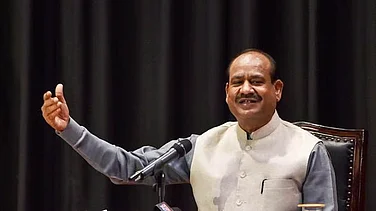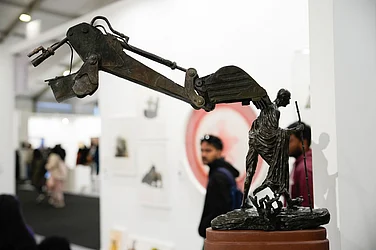T.N. Seshan's hand lies heavy over Madhya Pradesh: graffiti has been wiped out, there are few loudspeakers and fewer posters. "Very dull," says state Minister of Food Supplies, Satyadev Katare. Occasionally, the odd decorated jeep pulls along the roads. A few flags flutter from rooftops. "Because of the restrictions on spending, campaigning is being kept for the last couple of days before polling," says a Congress worker. In interior villages, posters and flags decorate individual houses. Except for the motorcades seen criss-crossing the sun-burnt countryside, it's difficult to believe the state is in the throes of Lok Sabha campaigning.
In the state with the maximum "hawala-tainted" ministers, Chief Minister Digvijay Singh is fighting a tough battle. Facing thin crowds during his campaigning in Guna, Morena, Bhind and in Rajgarh, where his brother Lakshman Singh faces a powerful Congress(T) candidate, he once stomped out of a meeting and told the crowd to "go to hell" after his own party workers heckled him. "A completely non-performing regime which will fall after the elections," thunders former chief minister and BJP leader Sunder-lal Patwa. "Digvijay Singh will not even find pallbearers to carry his government out of the house!" shrieks Uma Bharati, campaigning in Khajuraho district. Digvijay Singh himself sounds subdued. "Hawala's not an issue because all the affected, such as Kamal Nath, are working for the Congress. We'll win 22 seats," he says. But his optimism is as barren as the landscapes of his home state where observers say the Congress will be lucky to get 10 seats against 20-25 for the BJP. "Even Scindia's rebellion hasn't made a difference to the Congress," he asserts.
"Ours is a conservative society," says a Bhopal resident, "we don't approve of those who have double standards. Digvijay Singh prostrates himself at the Rajmata's feet, then abuses her. He has betrayed his mentor, Arjun Singh. He has announced programmes like panchayat empowerment which have not taken off the ground." Says Ajay Singh: "Digvijay Singh's government is kaput."
Yet 'thakurvaad' remains strongly entrenched here and may yet again come to Digvijay Singh's rescue. Liberal ideologies have least influ-enced this state. Thakurs have traditionally sorted out things by inter-elite ruling arrangements irrespective of party loyalties. In Satna, (Arjun Singh's seat), BJP tha-kurs are reportedly with the Congr-ess(T); a member of Digvijay Singh's cabinet is Arjun Singh's brother-in-law. Says a Congress MLA: "The reason why the Congress has fielded a lame duck against the Congress(T) is because Digvijay Singh wants to ensure Arjun Singh's victory."
Yet there is no "Arjun wave" in Satna. Says Anand Suraj, a textile merchant: "What has he done for us? We have water problems, our roads are bad, there is unemployment. He just gets our votes and goes away to Delhi, he has done nothing for us." Urmila Chandra is a Congress loyalist. "Arjun Singh shouldn't have broken the Congress, he should not have broken a party for which we have worked for so long," she says. Confronting Arjun Singh in Satna is Virendra Kumar Saklecha of the BJP, a veteran leader, but old and a little tired. At a rally in Babupur village, he was hardly able to stand at the mike. Yet his promises are strong: "Work in every hand, water in every field." The dust swirls as white Ambassadors trundle in and out of villages. The gathered faces are expectant but rarely passionate.
"Will you not vote for Kunwar Sahib simply because he has not visited you?" asks Ajay Singh at Uchehra village. A group of women reply in sotte voce: "What do these rich people know about our troubles?"
Anti-incumbency feelings are making Arjun Singh's position vulnerable. In Satna, Harijans and Adivasis could well help the BSP candidate win. "Or Arjun Singh could win by foul means," says a local journalist.
The candidate who never has to worry about anti-incumbency syndromes is the monarch of Gwalior. Madhavrao Scindia is as dynamic as ever, as intelligent about his USP as maharaja as any aspiring Lok Sabha MP should be. "I used to come here," he tells a gathering at Rora, "gun in hand, looking for deer to hunt, as did my forefa-thers." The speech changes a little in Dabra, which is a largish town. From aristocratic paternalism, the focus becomes one of development. "I will work for the poor of the country, I will fight for the economically underprivileged."
His personality cult has never been larger, the folklore surrounding him never more various. "He prays at this very temple," say flower-sellers at Gwalior's main Bara market. A painter recalls how he was invited to the palace for a function.
Notwithstanding confusion about his electoral symbol, the maharaja is preparing for a royal ride into the 11th Lok Sabha with the support of at least 15 MLAs from Digvijay's government. Stopping at roadside temples, holding up his symbol of the rising sun at every village meeting, he has a different mission this time: not just to win, but to win with a thumping margin that will prove that he doesn't need the Congress. Yet there are certainly kingly worries.
"When the candidate is weak," says Scindia, "my margin is the lowest. Because people say, 'oh maharaj is bound to win', and they don't come out to vote. One of my efforts now is to ensure good voter turnout." From Morena, Bhind, Shivpuri and Gwalior itself, the house of Scindia reigns supreme. "We don't vote for him because he is our king," says a Gwalior businessman, "but because he has done so much work for Gwalior. We had never seen a full-scale cricket match in Gwalior until he organised it."


























